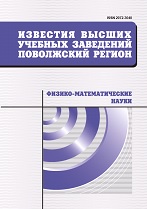|
|
University proceedings. Volga region. Physical and mathematical sciences, 2014, Issue 3, Pages 179–197
(Mi ivpnz341)
|
 |
|
 |
Physics
The method of conditional decomposition of empirical distributions and its application to the analysis of a series of observations
V. M. Zhuravlev, V. M. Morozov, M. S. Petryakov, V. V. Samoylov
Ulyanovsk State University, Ulyanovsk
Abstract:
Background. One of the ways to analyze a series of observations is to analyze the empirical probability distributions (histograms). The challenge with this approach is to find the fundamental properties of the physical processes responsible for the variability of the observed parameters of physical and other systems. One of the ways to identify all existing physical factors in the observed system is the decomposition method of empirical distributions. Decomposition enables a histogram to be represented as a mixture, each component of which can be interpreted as the probability distribution of one of the mechanisms; with specific characteristics. The standard approach to the decomposition is the method of moments in conjunction with a predetermined set of theoretical distributions that are chosen to undertake the actual decomposition. In this case the signs of separation are actually excluded from the analysis, which often leads to difficulties in the interpretation of results. Therefore, the topical problem of series processing is the development of a decomposition method using a histogram of empirical features that are directly involved in the data processing. The aim of this work is to construct the decomposition method, a series of observations using the empirical evidence of the formation of a number of separate values based on the statistical characteristics of the series. Materials and methods. In implementation of the decomposition method there is an important requirement to generate statistically stable signs to be checked at the time of the algorithms. Persistent signs on the basis of the initial series of observations can be constructed using these or other statistics. As each characteristic must relate to each individual series element, in this study the authors used two methods. These are the method of regression models and the method of calculating the basic statistics of moving rows. Results. The main result is the creation of mathematical algorithms of conventional decomposition and its application to the decomposition of the empirical distributions of a number of Wolf numbers (monthly number of sunspots) and hourly series of atmospheric pressure in 2009. The authors found components of distributions and analyzed the variability of the parameters of empirical distributions and the evolution of the a priori probabilities using moving series. Conclusions. The proposed method of conditional decomposition gives a much more efficient method of separating components in the histogram than decomposition methods, based on the method of moments for the theoretical given mixture distributions. The method is suitable for the majority of systems, provided the basic principles of sustainable identifying features are formulated on the basis of the series of observations themselves. It is shown that for this purpose one can use both the methods of regression models and the methods of basic statistics calculation, such as variance, for moving series observations.
Keywords:
statistical characteristics of a series of observations, empirical probability distribution, method of decomposition of distributions, evolution of the statistical parameters, sliding series of observations.
Citation:
V. M. Zhuravlev, V. M. Morozov, M. S. Petryakov, V. V. Samoylov, “The method of conditional decomposition of empirical distributions and its application to the analysis of a series of observations”, University proceedings. Volga region. Physical and mathematical sciences, 2014, no. 3, 179–197
Linking options:
https://www.mathnet.ru/eng/ivpnz341 https://www.mathnet.ru/eng/ivpnz/y2014/i3/p179
|

| Statistics & downloads: |
| Abstract page: | 46 | | Full-text PDF : | 16 | | References: | 19 |
|




 Contact us:
Contact us: Terms of Use
Terms of Use
 Registration to the website
Registration to the website Logotypes
Logotypes








 Citation in format
Citation in format 